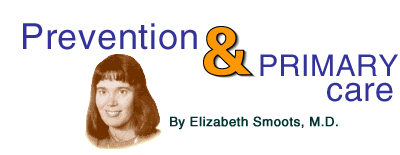
Healthy Lifestyle, Healthy Prostate
Joe is worried. His father and uncle both had prostate cancer, and Joe is approaching 50, the age at which his father first developed the disease. "I'm thinking about it too much," he says. "Isn't there something I can do?"
Joe's concern is valid. Among men, prostate cancer is the most common cancer and the second leading cause of cancer deaths. One in six men will develop a growth in their prostate, a walnut-sized gland at the base of the urinary bladder. The function of the prostate is to produce a fluid that becomes part of semen.
Risks for prostate cancer
After age 50, the chance of developing prostate cancer increases rapidly; by age 80, nearly 70 percent of men develop at least low levels of the disease. African Americans are at increased risk, as are those with a family history of prostate cancer.
What man wouldn't want to beat these odds? No one knows what causes prostate cancer or, definitively, how to prevent it. Medical authorities have, however, made some educated guesses based on promising early results from prostate cancer research. Below are nine recommendations for protecting your prostate:
Prevention of prostate cancer
Physical fitness. Exercise regularly, and maintain a healthy weight.
Not smoking. Quitting smoking (or chewing tobacco) can cut your risk of cancer by up to 40 percent.
Screening. Starting at age 40, contact your health care provider about routine screening for prostate cancer. Recommendations vary but may include a digital rectal exam or a blood test for prostatic-specific antigen (PSA).
Low-fat diet. Limit the fat in your diet, especially animal fat, such as dairy, eggs, and meat.
Fiber. Eat a plant-based diet with plenty of fiber from whole-grain breads and cereals, legumes, fruits, and vegetables.
Vitamin E. Get adequate amounts of the antioxidant vitamin E. In a study of 29,000 Finnish smokers, men taking 50 mg (about 50 IU) of vitamin E had a 32 percent reduced risk of developing prostate cancer. The study's researchers acknowledge the limitations of their findings due to the narrow scope of the study (Caucasian male smokers); however, the results are promising. Always check with your health care provider before taking supplements, especially if you're on blood thinners or other medications. The best food sources of vitamin E include brown rice, wheat germ, nuts, seeds, and vegetable oil.
Selenium. Include this trace mineral in your diet. Results of a ten-year cancer prevention trial suggest selenium may help reduce the risk of prostate cancer. Selenium supplements are not currently recommended because they're toxic in excess amounts. You can get enough selenium by eating whole grains, fish, and meat.
Soybeans. Add soy products to your diet, such as tofu, tempeh, and soy milk. New research is looking at how soy foods may help lower prostate cancer risk.
Green tea. Take time for green tea. Preliminary evidence suggests a plant substance called EGCG, present in green tea leaves, may prove useful for prostate cancer prevention. According to early studies, EGCG may inhibit the growth of cancer cells.
Elizabeth Smoots, M.D., F.A.A.F.P., is a board-certified family physician in Seattle, Washington. A fellow of the American Academy of Family Physicians, Dr. Smoots writes about prevention and primary care medicine.
Related links:
Rx.magazine article: Soy Power: The Benefit of the Bean
Outside link: Information from the University of Pennsylvania Cancer Center

